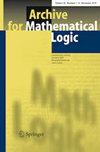Maximal Tukey types, P-ideals and the weak Rudin–Keisler order
IF 0.4
4区 数学
Q1 Arts and Humanities
引用次数: 0
Abstract
In this paper, we study some new examples of ideals on \(\omega \) with maximal Tukey type (that is, maximal among partial orders of size continuum). This discussion segues into an examination of a refinement of the Tukey order—known as the weak Rudin–Keisler order—and its structure when restricted to these ideals of maximal Tukey type. Mirroring a result of Fremlin (Note Mat 11:177–214, 1991) on the Tukey order, we also show that there is an analytic P-ideal above all other analytic P-ideals in the weak Rudin–Keisler order.
最大图基类型、P-理想和弱鲁丁-凯斯勒阶
在本文中,我们研究了一些具有最大图基类型(即在大小连续的部分阶中最大)的 \(\omega \) 上理想的新例子。讨论将转入对 Tukey 阶的细化--即弱 Rudin-Keisler 阶--及其结构的研究,当它被限制在这些最大 Tukey 型的ideals 时。与弗雷姆林(Note Mat 11:177-214, 1991)关于图基阶的一个结果一样,我们也证明了在弱鲁丁-凯斯勒阶中,有一个解析 P 理想高于所有其他解析 P 理想。
本文章由计算机程序翻译,如有差异,请以英文原文为准。
求助全文
约1分钟内获得全文
求助全文
来源期刊

Archive for Mathematical Logic
MATHEMATICS-LOGIC
CiteScore
0.80
自引率
0.00%
发文量
45
审稿时长
6-12 weeks
期刊介绍:
The journal publishes research papers and occasionally surveys or expositions on mathematical logic. Contributions are also welcomed from other related areas, such as theoretical computer science or philosophy, as long as the methods of mathematical logic play a significant role. The journal therefore addresses logicians and mathematicians, computer scientists, and philosophers who are interested in the applications of mathematical logic in their own field, as well as its interactions with other areas of research.
 求助内容:
求助内容: 应助结果提醒方式:
应助结果提醒方式:


